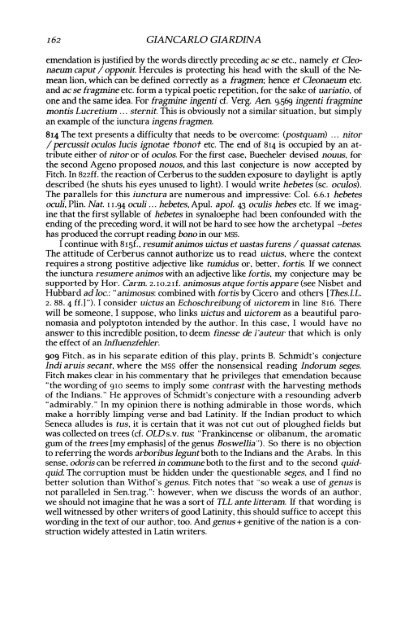MOUSEION - Memorial University of Newfoundland
MOUSEION - Memorial University of Newfoundland
MOUSEION - Memorial University of Newfoundland
Create successful ePaper yourself
Turn your PDF publications into a flip-book with our unique Google optimized e-Paper software.
162 GIANCARLO GIARDINA<br />
emendation is justified by the words directly preceding ac se etc.. namely et Cleonaeum<br />
caput / opponit. Hercules is protecting his head with the skull <strong>of</strong> the Nemean<br />
lion. which can be defined correctly as a fragmen: hence et Cleonaeum etc.<br />
and ac se fragmine etc. form a typical poetic repetition. for the sake <strong>of</strong> uariatio. <strong>of</strong><br />
one and the same idea. For fragmine ingenti d. Verg. Aen. 9.569 ingenti fragmine<br />
montis Lucretium ... sternit. This is obviously not a similar situation. but simply<br />
an example <strong>of</strong> the iunctura ingens fragmen.<br />
814 The text presents a difficulty that needs to be overcome: (postquam) ... nitor<br />
/ percussit oculos Iuds ignotae tbonot etc. The end <strong>of</strong> 814 is occupied by an attribute<br />
either <strong>of</strong> nitoror <strong>of</strong> oculos. For the first case. Buecheler devised nouus. for<br />
the second Ageno proposed nouos. and this last conjecture is now accepted by<br />
Fitch. In 822ff. the reaction <strong>of</strong> Cerberus to the sudden exposure to daylight is aptly<br />
described (he shuts his eyes unused to light). I would write hebetes (sc. oculos).<br />
The parallels for this iunctura are numerous and impressive: Col. 6.6.1 hebetes<br />
oculi. Plin. Nat. 11.94 oculi ... hebetes. Apul. apol. 43 oculis hebes etc. If we imagine<br />
that the first syllable <strong>of</strong> hebetes in synaloephe had been confounded with the<br />
ending <strong>of</strong> the preceding word. it will not be hard to see how the archetypal -betes<br />
has produced the corrupt reading bono in our MSS.<br />
I continue with 81Sf.. resumit animos uictus et uastas furens / quassat catenas.<br />
The attitude <strong>of</strong> Cerberus cannot authorize us to read uictus. where the context<br />
requires a strong postitive adjective like tumidus or. better. fortis. If we connect<br />
the iunctura resumere animos with an adjective like fortis. my conjecture may be<br />
supported by Hor. Carm. 2.IO.2If. animosus atque fortis appare (see Nisbet and<br />
Hubbard ad loc.: "animosus: combined with fortis by Cicero and others [Thes.l.L.<br />
2.88.4 ff.]"). I consider uictus an Echoschreibung<strong>of</strong> uictorem in line 816. There<br />
will be someone. I suppose. who links uictus and uictorem as a beautiful paronomasia<br />
and polyptoton intended by the author. In this case. I would have no<br />
answer to this incredible position. to deem finesse de l'auteur that which is only<br />
the effect <strong>of</strong> an Influenzfehler.<br />
909 Fitch. as in his separate edition <strong>of</strong> this play. prints B. Schmidt's conjecture<br />
Indi aruis secant. where the MSS <strong>of</strong>fer the nonsensical reading Indorum seges.<br />
Fitch makes clear in his commentary that he privileges that emendation because<br />
"the wording <strong>of</strong> 910 seems to imply some contrast with the harvesting methods<br />
<strong>of</strong> the Indians." He approves <strong>of</strong> Schmidt's conjecture with a resounding adverb<br />
"admirably." In my opinion there is nothing admirable in those words. which<br />
make a horribly limping verse and bad Latinity. If the Indian product to which<br />
Seneca alludes is tus. it is certain that it was not cut out <strong>of</strong> ploughed fields but<br />
was collected on trees (d. OLDs.v. tus: "Frankincense or olibanum. the aromatic<br />
gum <strong>of</strong> the trees [my emphasis] <strong>of</strong> the genus Boswe1lia"). So there is no objection<br />
to referring the words arboribus legunt both to the Indians and the Arabs. In this<br />
sense. odoris can be referred in commune both to the first and to the second quidquid.<br />
The corruption must be hidden under the questionable seges. and I find no<br />
better solution than With<strong>of</strong>'s genus. Fitch notes that "so weak a use <strong>of</strong> genus is<br />
not paralleled in Sen.trag.": however. when we discuss the words <strong>of</strong> an author.<br />
we should not imagine that he was a sort <strong>of</strong> TLL ante litteram. If that wording is<br />
well witnessed by other writers <strong>of</strong> good Latinity. this should suffice to accept this<br />
wording in the text <strong>of</strong> our author. too. And genus + genitive <strong>of</strong> the nation is a construction<br />
widely attested in Latin writers.

















